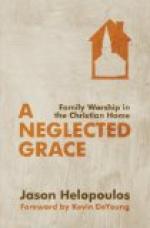Hence instead of resorting to the bible for a name, these sentimental parents will pore over filthy novels, or catch at some foreign accent, to get a name which may have a fashionable sound, and a claim upon the prevailing taste of the times, and which may remind one of the battles of some ambitious general, or of the adventures of some love-sick swain, or of the tragic deeds of some fashionable libertine!
And when such a name is found to suit the ear of fashion and of folly, it is applied to the child, and reiterated by the minister before the baptismal font; and as often as it is afterwards repeated it reminds one perhaps of deeds which put modesty to blush, and startle the ear of justice and humanity. What a burning shame is this to the Christian home! The child who is cursed with such a name has ever before him the memorandum of his parent’s folly, and as a recognized example, the character of him after whom he has been named. As often as he is hailed by it, he blushes to think that he has been called by pious parents after one who, perhaps, has turned many a home into desolation, and disgraced and blighted forever the fond hopes and joys of the young and old.
Have thoughts and associations like these no demoralizing influence? How can parents admonish their children against novel reading after they have taken their names from novels? The giving of Christian names at the present time is indeed a ridiculous farce, an insult to christianity, and a representation of stoical infidelity before the baptismal altar. It is there an act of the Babylonish king to heathenize the child. We might almost say that the folly has become a rage. The rage for new names especially,—names which do not adorn the sacred page, nor carry us back to the times and faith of our fathers, but which have gained notoriety in the world of fiction, and associate us with the lover’s affrays and with the desperado’s feats,—these are the names which Christian parents too often seek with avidity for their children. If you were to judge their homes by these names, you would think yourself in a Turkish seraglio, or amid the voluptuous scenes of a Parisian court, or in the bosom of a heathen family. What, for instance, is there about such names as Nero, Caesar, Pompey, Punch, that would remind you that you were in a Christian home?
It is often disgusting, too, to see how some Christian parents, who live in humble life, seek to ape, in their children, the empty sounding titles of the world. They only show their vanity and weakness, and often bring ridicule upon their children; for—
“To lend the low-born noble names,
is to shed upon them ridicule
and evil;
Yea, many weeds run rank in pride, if
men have dubbed them cedars,
And to herald common mediocrity with the
noisy notes of fame,
Tendeth to its deeper scorn, as if it
were to call the mole a mammoth.”




